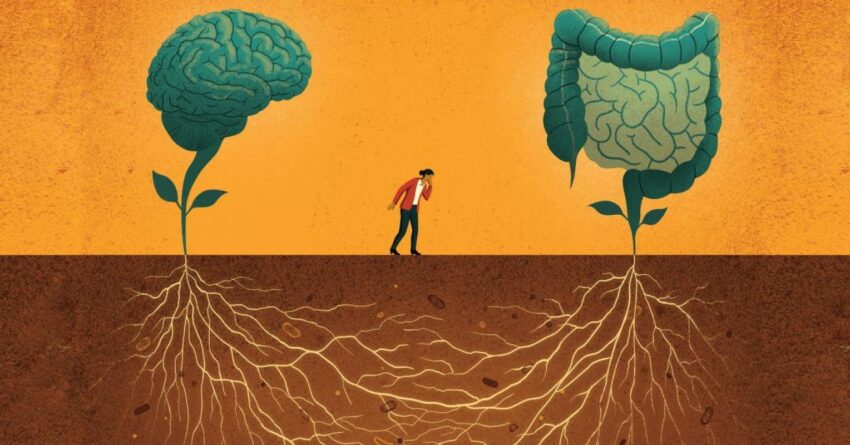You’re likely familiar with the “gut feeling” of anxiety that comes with unfamiliar social situations: your heart races, your palms get sweaty, and there’s a recognizable knot in your stomach. But what if the source of this anxious response isn’t only in your brain? What if it originates from the complex ecosystem within us known as the gut microbiome? Research exploring the connection between social anxiety disorder and gut microbiota unveils a surprising link between our inner microbial world and our emotional experiences.
Social anxiety disorder affects millions worldwide, causing distress in social situations. Recent research published in the Proceedings of the National Academy of Sciences (PNAS) sheds light on a fascinating connection between social anxiety and the gut microbiome. The study reveals that individuals with social anxiety have a distinct gut microbiota, and when transplanted into mice, it causes behavioral changes, particularly an increase in social fear. This groundbreaking finding unveils a new dimension in understanding the complex interplay between the gut, the brain, and behavior.
What Is the Gut Microbiome?
The gut microbiome is the diverse community of microorganisms in our digestive tract. Made up of bacteria, viruses, fungi, and other microbes, this ecosystem plays a crucial role in maintaining our overall health and well-being. The gut microbiome not only aids in digestion but also influences various physiological processes, including immune function, metabolism, and even brain function.
Several factors shape the composition and diversity of the gut microbiome. Psychological stress can disrupt the balance of gut microbes, leading to various health issues, including mental health disorders. The foods we eat profoundly impact the gut microbiome. A diet rich in fiber and diverse plant-based foods promotes a healthy microbial community, while a diet high in processed foods and sugars can alter microbial composition. Environmental factors, such as exposure to pollutants and antibiotics, can also influence the gut microbiome. Antibiotic use, in particular, can disrupt microbial diversity and composition.
How Does the Gut Microbiome Influence Behavior?
Various studies, such as one from the University of Oxford, have linked specific gut microbes to personality traits and emotional states. The gut-brain axis, a bidirectional communication system between the gut and the brain, serves as the mechanism through which gut microbes influence behavior. You might be surprised to learn microbes can also produce neurotransmitters, such as serotonin and gamma-aminobutyric acid (GABA), which have crucial roles in regulating mood and behavior. Gut bacteria manufacture about 95 percent of the body’s supply of serotonin, which influences both mood and GI activity. Understanding the influence of the gut-brain axis on behavior may pave the way for novel preventive strategies and lifestyle interventions aimed at promoting mental well-being and resilience across the lifespan.
Gut Microbiome Differences in Socially Anxious Patients
To observe the effects of gut microbiota on socially anxious behavior, the PNAS study researchers used the technique of fecal microbiota transplantation. Fecal samples were gathered from human donors with a social anxiety disorder diagnosis and from healthy control donors. The mice were given antibiotics to get rid of their own microbiota so that the impact of the socially anxious or control microbiota could be accurately observed. After receiving the donor samples, the mice were tested for social fear, sociability, social cognition, and stress-coping behaviors.
The PNAS study found notable differences in the gut microbiota of individuals with social anxiety compared to non-anxious controls. Specifically, the social anxiety-associated gut microbiome increased sensitivity to fear while simultaneously decreasing stress resilience and immune function. These findings underscore the intricate relationship between the gut microbiome and mental health, revealing how dysregulation in the gut can contribute to psychiatric disorders.
Implications and Future Uses
This research highlights the importance of maintaining a healthy gut microbiome for overall well-being, including mental health. Adopting lifestyle habits that support microbial diversity, such as consuming a balanced diet rich in fiber and probiotic foods, managing stress effectively, and minimizing unnecessary antibiotic use, may help promote a healthy gut microbiome. One study found that probiotics were more effective than prebiotics at treating anxiety and depression, especially in clinical samples. Another promising study effectively used probiotics to treat anxiety disorders by balancing the intestinal environment. Understanding the role of the gut-brain axis in mental health opens new avenues for potential treatments, including probiotics and microbiota transplantation, as adjunctive therapies for psychiatric disorders like social anxiety disorder.
In conclusion, the study linking social anxiety to alterations in the gut microbiome represents a significant advancement in our understanding of the complex interplay between the gut, the brain, and behavior. By unraveling the mechanisms underlying this relationship, researchers are paving the way for novel therapeutic interventions and personalized approaches to mental health care. Ultimately, prioritizing gut health may prove to be a pivotal step toward fostering emotional resilience and well-being in individuals with social anxiety and beyond.
